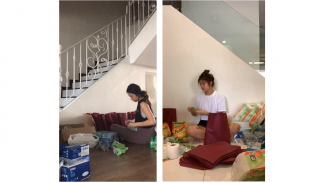
As the dark clouds of Covid-19 loomed towards Singapore, final-year Lee Kong Chian School of Business student Victoria Neo felt a nagging conviction: she could not play the role of passive spectator in this dramatic episode. So she approached her good friend and fellow batch-mate Jaslyn Quek, and together, they decided to act.
The day before the start of the Circuit Breaker, Victoria proposed an idea to help the working elderly. Despite being busy with their ongoing internships, they hatched a plan and strategised a timeline to raise funds in order to provide care packs for seniors engaged in essential services when most of Singapore would shut.
“We both have a soft spot for our grandmothers, so it was natural for us to want to help the working elderly, especially since they are overlooked during this period,” explained Victoria.
For Jaslyn, who has prior experience volunteering with the elderly and was president of SMU’s orientation community service project Inspirar in 2018, helping seniors meant harnessing her skills and knowledge in the area. The duo started a campaign called #STAYSAFEAHMA, as a tribute to their ah-mas (‘grandmothers’ in dialect), and the brave seniors working during the Circuit Breaker period.
On 10 April - four days after their first project conversation – they began fund-raising via social media. They received overwhelming support from family, friends and even strangers, and in just three hours, raised close to $10300 – more than five times their initial goal. Their most significant contributions were an $800 donation from a fellow SMU peer, and toilet roll sponsorship for their care packs.
The increased amount raised meant they could put together 320 care packs, instead of 100 which they earlier planned to give away. Each pack included items like a thermometer, medicated oil, cooling drinks, biscuits, hygiene items, as well as a $10 angpow. A remaining amount of $384 was also donated to Ling Kwang Home for Senior Citizens.
The project was not without challenges. As strict Circuit Breaker measures were in place, limited and tight delivery slots meant delays in obtaining some items, while others had to be replaced at the last minute. When everything finally arrived on 10 May, Jaslyn and Victoria had to pack the items at their respective homes to keep manpower just between them, even though several friends had offered to help pack and deliver the items.
Next came their four-day task of ferrying carloads of care packs all over Singapore, scouring locations to find potential beneficiaries, then convincing them of their good intentions. One might assume this would have been the easy part but Victoria revealed some awkward moments: first, there was the language barrier which left her tongue-tied on several occasions. “It is a good thing that Jaslyn can speak Mandarin and dialect well,” she chuckled.
One of the more memorable occasions was when an elderly cleaner received the care pack with a broad smile, then showed off its contents to his younger colleagues. That singular incident made the pair feel their efforts worthwhile.
While most recipients graciously accepted the packs, a number hesitated, asking the duo to gift others who needed the items more instead. Victoria shared that an elderly trishaw uncle even told them off for “not needing help”. The pair realised that many seniors – just like any of us – hold strong to their sense of pride and do not want to be perceived as needy, while some thought of others more than themselves.
The distribution exercise was undoubtedly exhausting but gave Jaslyn and Victoria an opportunity to talk to seniors and listen to their stories. More than anything, it enriched them with empathy. Said Victoria: “Our bodies ached badly and we imagined how tough it must be for these elderly doing physical work every day.”
The “extremely fulfilling” experience, as Victoria describes it, was also a lesson on gratitude. She added, “Many of these seniors have no choice but to work because of individual circumstances, and this taught us that no matter how uncomfortable or tough situations get, we need to always be thankful for what we have.”
Victoria acknowledged that even after the pandemic ends, societal issues will persist, so help should not end. “We can all do our part for the community - like volunteering, donating or shedding light on causes, and just be understanding.”
For Jaslyn, the project opened her eyes to the impact and power of social media - not just for frivolous purposes – but for channelling good. It showed her the significance of a strong support backing in the form of family and friends, and very importantly, a teammate with similar values and ideals who always had her back. On a personal level, it also gave her personal growth.
“I learnt a lot about myself - my strengths and weaknesses, and how my mind perceives situations and biases.”
She summed up both their thoughts on their project, simply: “Even though this is a very trying period we’re all going through, looking back, it feels nice knowing that we did something good to give back.”